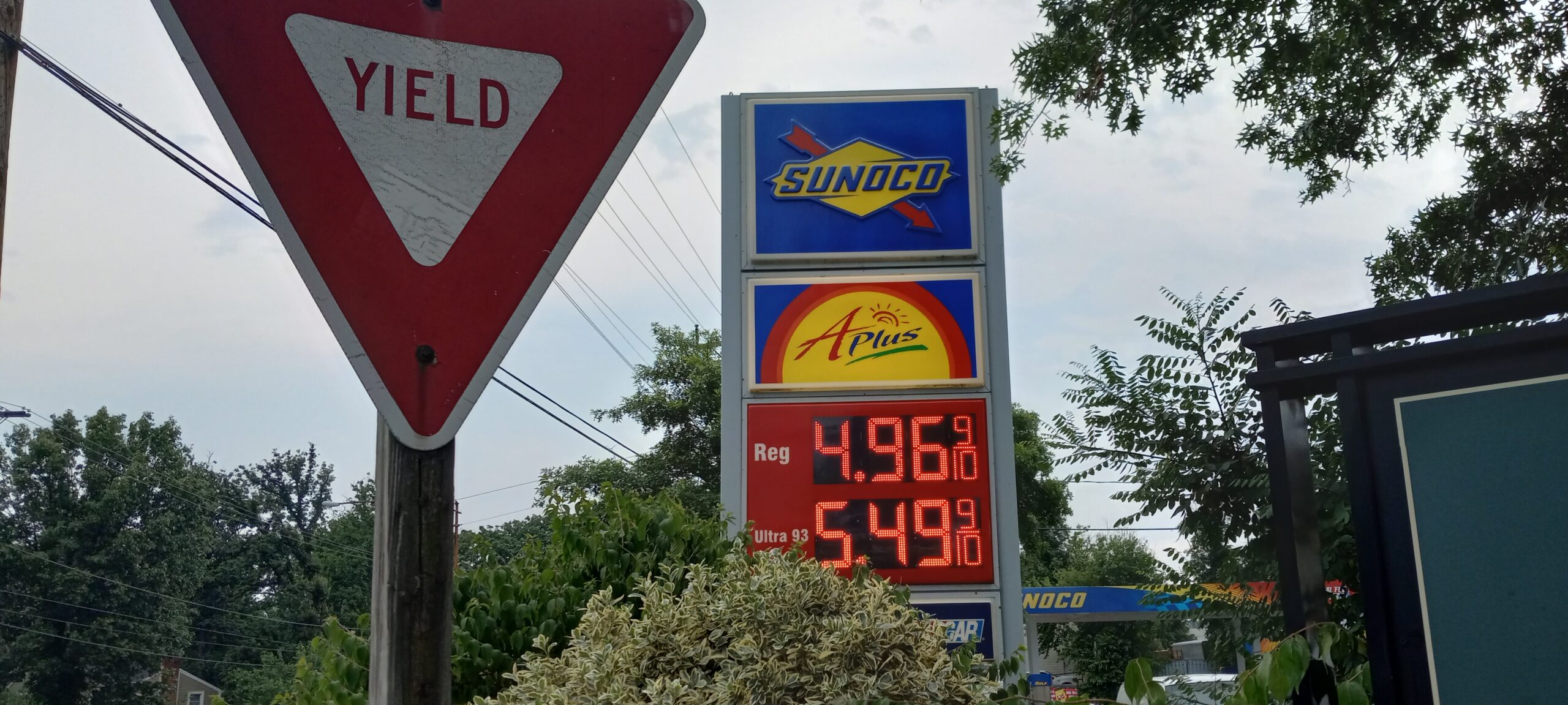Biden Call for Gas Tax Relief Reignites Special Session Debate in Annapolis

President Biden’s call Wednesday for Congress and state legislatures to provide a temporary reprieve from gas taxes reignited a fight by policymakers in Annapolis about how to proceed.
Congress appears unlikely to pass a holiday on the federal gas tax, while in Maryland legislative leaders continue to resist a call to go into special session — even though the state gas tax is due to increase by 6.6 cents at the end of next week, bringing it to almost 43 cents a gallon.
Maryland did enact a 30-day holiday on the gas tax in March, but lawmakers did not move to extend it after it expired. Despite calls from Gov. Larry Hogan (R), Comptroller Peter Franchot (D) — a candidate for governor — and other political actors to hit pause again, House Speaker Adrienne Jones (D-Baltimore County) and Senate President Bill Ferguson (D-Baltimore City) said last month that failing to collect the state gas tax would hurt government-funded road and transit projects that rely on the revenue.
The calls for Maryland to act grew louder Wednesday after Biden said a 90-day pause on federal and state gas taxes would help alleviate the tight budgets many families are facing as prices climb. He also asked petroleum companies to increase the number of refineries producing gas for vehicles. And he said companies should pass on the slightly lower price of gasoline per barrel to consumers as well as the savings from any gas tax holiday, instead of keeping it themselves.
“I call on the companies to pass this along, every penny of this 18-cent reduction, to the consumers,” Biden said, referring to the federal gasoline tax. “There’s no time now for profiteering.”
If all four things were to take place — a federal gas tax holiday, a state break, increased refining and companies passing along lower prices of gasoline — prices could come down by $1 per gallon, he said.
According to AAA, the average regular price per gallon in Maryland is now $4.93, up from $4.61 per gallon a month ago.
But on Capitol Hill, Democrats and Republicans appeared opposed to a holiday, making it look unlikely at the federal level. And many state legislatures, including Maryland’s, are out of session for the year and aren’t expected to return to their capitals until January.
Still, Hogan, Franchot and others ramped up pressure on Jones and Ferguson to schedule a special session in Annapolis.
In a statement, Hogan, who is on a trade mission to Western Europe, noted that the state had already shown that a pause on the gas tax can work.
“Nearly 100 days ago, Maryland became the first state in the nation to suspend the gas tax, and we proved that it can be done successfully to lower prices for working Americans,” he said. “We have also been calling on President Biden to take action to suspend the federal gas tax, and we are pleased that he has now finally agreed to do so. With the pain at the pump only getting worse, Congress should act immediately to suspend the federal gas tax.”
As for the legislature, Hogan said “there is no reason why” lawmakers couldn’t be summoned to Annapolis for a quick special session before the July 4 holiday weekend. And he also suggested that Franchot may have the authority to suspend collecting the gas tax unilaterally, without legislative approval — powers the comptroller’s office insists he does not have.
Franchot, for his part, wrote a letter to Jones, Ferguson, U.S. House Speaker Nancy Pelosi (D-Calif.) and U.S. Senate Majority Leader Chuck Schumer (D-N.Y.), urging them to enact the gas tax holiday.
“As Maryland’s chief fiscal officer and motor fuel regulator, I call on the leadership of the Congress and — once again — call on the leadership of the Maryland General Assembly to act expeditiously and enact a gas tax holiday until the end of September,” Franchot wrote. “If both Congress and the General Assembly heed the President’s — and your constituents’ — call to action, residents and businesses here in Maryland will save nearly $550 million over the next three months. These are significant savings for Marylanders, families, and small businesses who are seeing their household budgets and business margins decimated through no fault of their own.”
Franchot plans to press his point at a news conference at a service station on Patterson Avenue in Baltimore Thursday morning. While it’s billed as an official comptroller’s office event, the appearance will attract widespread media coverage and be enormously beneficial to Franchot’s gubernatorial campaign.
Former Maryland Commerce Secretary Kelly Schulz, the frontrunner in the Republican primary for governor, echoed the calls for a special session, saying lawmakers had an obligation to eliminate “the inflation tax,” as she has taken to calling the gas tax, which under state law increases at the rate of inflation every year on July 1.
Schulz also took a whack at Franchot, saying, “Comptroller Franchot could stop this coming increase on his own but he would rather hide behind his lawyers. He should step up and lead.”
And the Maryland House Republican Caucus renewed its call for a special session Wednesday.
“Why are Maryland’s Democrats refusing to help our citizens?” said House Minority Leader Jason Buckel (R-Allegany).
In a joint statement, Ferguson and Jones appeared unmoved by the calls for a special legislative session — but embraced the idea of a federal gas tax holiday.
“The Maryland General Assembly already did exactly what President Biden is proposing at the federal level: implemented a temporary pause on the State gas tax while backfilling our Transportation Trust Fund to ensure maintenance of our roads and bridges,” the presiding officers said. “States cannot unilaterally bear the burden of increased gas prices driven in part by Putin’s aggression in Ukraine and in part by the corporate greed of oil companies bringing in record profits. We hope to see Congress follow Maryland’s lead and give all Americans a respite from increasing prices at the pump.”
No love on Capitol Hill
But Congressional Democrats seemed lukewarm, at best, about Biden’s proposal.
U.S. House Transportation and Infrastructure Committee Chairman Peter DeFazio, an Oregon Democrat, rejected the idea of a gas tax holiday before Biden gave his afternoon speech.
“Although well-intentioned, this policy would at best achieve only miniscule relief while blowing a $10 billion dollar hole in the Highway Trust Fund that would need to be filled if we want to continue to fix crumbling bridges, address the spike in traffic deaths, and build a modern infrastructure system,” DeFazio said in a statement.
“Furthermore, encouraging state governments to suspend their gas taxes undermines the impact of the Bipartisan Infrastructure Law by reducing funds available to states to spend on infrastructure improvements,” DeFazio continued.
Pelosi said in a statement that she will “see where the consensus lies on a path forward for the President’s proposal in the House and the Senate.”
Schumer said he believes “the most important thing we can do to lower gas prices is crack down on big oil’s manipulation of the oil markets.”
Jason Furman, chairman of the Council of Economic Advisers during the Obama administration, said Tuesday that a gas tax holiday likely wouldn’t provide drivers much relief.
“Whatever you thought of the merits of a gas tax holiday in February it is a worse idea now,” he tweeted. “Refineries are even more constrained now so supply is nearly fully inelastic. Most of the 18.4 cent reduction would be pocketed by industry–with maybe a few cents passed on to consumers.”
While Furman had previously “guesstimated that two-thirds of the benefits might go to consumers,” he said this week that was “probably overly generous at the time.”
The nationwide average price for a gallon of gasoline has steadily increased this year from about $3.30 in January to just under $5 in mid-June, according to AAA.
The U.S. gas tax was last increased in 1993 from 14.1 cents to 18.4 cents per gallon. The nationwide tax on diesel is 24 cents a gallon.
Much of that money goes to the Highway Trust Fund, which gets about 80% of its funding from gas taxes, which it then uses to fund road construction and other transportation infrastructure projects.
The U.S. gas tax is not tied to inflation, which means that in the nearly 30 years since it was last increased, it has lost more than 45% of its purchasing power, according to the Peter G. Peterson Foundation.
The United States is not the only country facing high inflation and rising gas prices.
More than 90 countries, including Hong Kong ($11.35), Israel ($8.71) and Canada ($6.55), all have higher gasoline prices per gallon than the United States, according to a website that tracks global prices.
Jacob Fischler contributed to this report.





 Creative Commons Attribution
Creative Commons Attribution